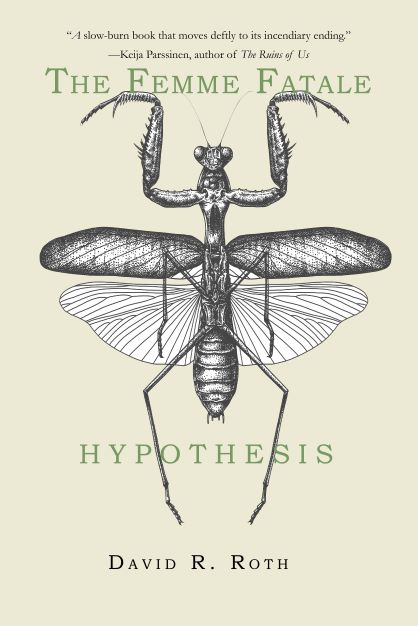Editor’s Note: This exchange is part of a series of brief interviews with emerging writers of recent or forthcoming books. If you enjoyed it, please visit other interviews in the I’ve Got Questions feature.
- What’s the title of your book? Who is the publisher and what’s the publication date?
- The Femme Fatale Hypothesis
- November 19, 2021
- In a couple of sentences, what’s the book about?
As Rose Geddes’s late-stage lung cancer progresses and her husband Kelsey’s ability to care for her diminishes, their neighbor, June Danhill, stumbles into the middle of this couple’s intersecting crises. It isn’t long before June realizes that Rose wants more from her than she is willing to give. Love and loss, family secrets, a long-forgotten keepsake, and the sexual cannibalism of the false garden mantid all fuel this dark drama that tests the thin line between mercy and murder.
- What’s the book’s genre (for fiction and nonfiction) or primary style (for poetry)?
Adult Literary Fiction
- What’s the nicest thing anyone has said about the book so far?
Wow – so many people I admire agreed to write blurbs for the book and they all wrote really terrific comments. It’s impossible to pick one.
- What book or books is yours comparable to or a cross between? [Is your book like Moby Dick or maybe it’s more like Frankenstein meets Peter Pan?]
Though it’s not apples to apples, I like to think of Kent Haruf’s Our Souls at Night as being a book in the same spirit as mine; older characters living quite lives and dealing with aging, grief, loss and the shadow of death.
- Why this book? Why now?
The period during which I quit my job, returned to school for my MFA, and began to focus on my own fiction was marked by the deaths of several people close to me. Experiencing those deaths got me thinking about how we die in this culture, why we fear it so much, and why we tend to outsource the experience to professionals whose livelihoods depend on our staying alive, whether we want to or not. I wanted to explore some of those questions in a fictional context.
- Other than writing this book, what’s the best job you’ve ever had?
I was the head writer and director for a small firm that created interactive training courses involving behavior in corporate settings, including things like sexual harassment, bribery, insider trading. I really enjoyed exploring non-linear storytelling, allowing learners to pick paths and see consequences. It was great fun writing dramatic scenes and then seeing how the page translated to the screen.
- What do you want readers to take away from the book?
My hope is that readers both enjoy the story for what it is – a few months in the lives of three people facing difficult circumstances – and that it inspires them to consider how they think their own mortality.
- What food and/or music do you associate with the book?
A hearty soup, a warm baguette, Taleggio and fig jam delivered on a bed tray table with Samuel Barber’s Adagio for Strings playing in the background.
- What book(s) are you reading currently?
Umberto Eco’s The Mysterious Flame of Queen Loana
Stephen Jenkinson’s Come of Age: The Case for Elderhood in a Time of Trouble
Learn more about David at his website.
Follow him on Facebook.
Buy the book from the publisher (Regal House Publishing), Amazon, or Bookshop.org.


